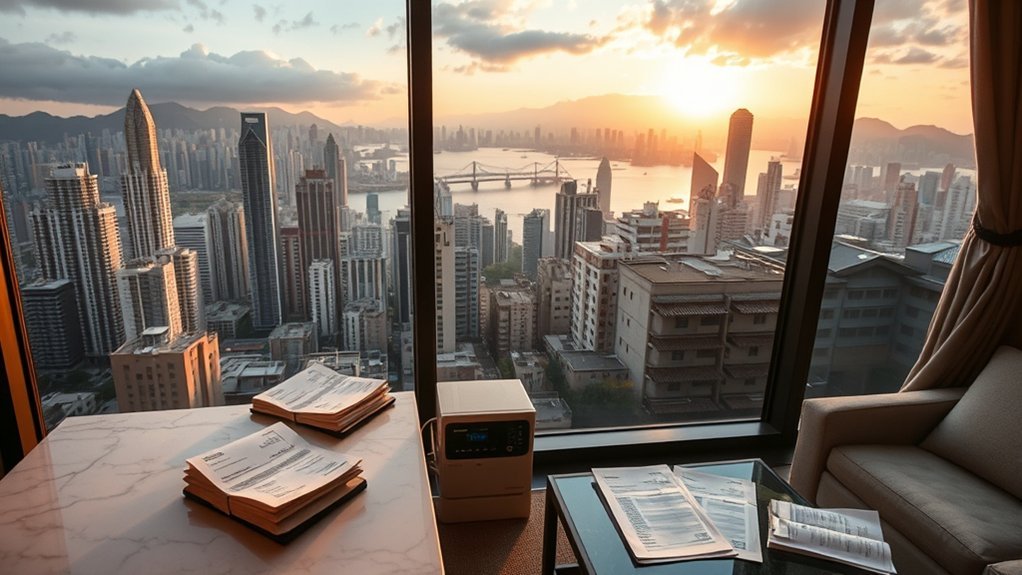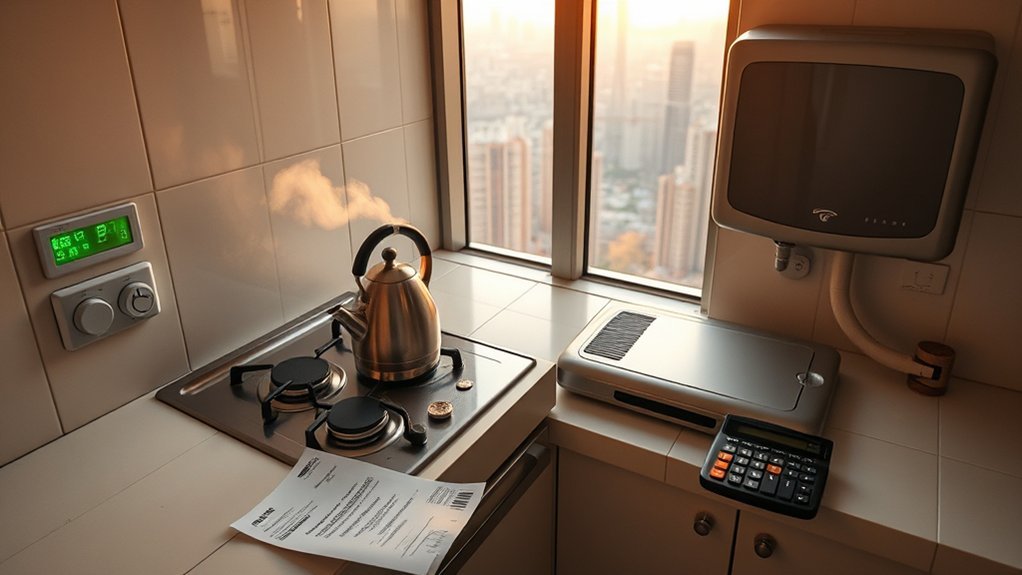You’ll typically spend about HK$24K–32K+ monthly as a single with rent (assuming a 1-bed; see rent ranges below) and around HK$8,200 without rentLivingcost (2025-10-18). Rent often takes roughly ~52% of city-wide spending, so it will largely determine your disposable incomeLivingcost (2025-10-18). A city-center 1-bed runs ~HK$23–24K, outside center ~HK$16KLivingcost (2025-10-18). Utilities and internet for ~915 sq ft average about HK$1.9K + HK$270 (≈HK$2.2K total)Livingcost (2025-10-18). Groceries for one are commonly HK$2–3.5K; transport HK$500–1,200 depending on commute. Private healthcare or school fees can raise budgets sharply. Keep this benchmark handy — more itemized figures and saving tips follow.
Quick Overview: Monthly Budgets for Singles, Couples and Families

Wondering how much living in Hong Kong will cost you each month? You’ll find clear, data-driven benchmarks: a single person’s monthly budget without rent averages ~HK$8,202Livingcost (2025-10-18). With rent, totals typically fall around HK$24K–32K+ depending on district and unit (e.g., 1-bed city centre ≈HK$23.4K; outside centre ≈HK$16.2K)Livingcost (2025-10-18). For a family of four, expect about ~HK$20,605 without rentLivingcost (2025-10-18); add your chosen 3-bed rent (see ranges below) for a realistic all-in figure.
Use Rent percentage to gauge impact: city-wide housing represents roughly ~52% of spending; Transportation ~5% and Food/Groceries ~14% — concrete shares to allocateLivingcost (2025-10-18). Typical rents (1-bedroom and 3-bedroom, city centre vs outside) provide context for how different choices shift your monthly budget. These benchmarks help you make precise adjustments to lifestyle or savings targets based on real proportions rather than rough guesses.
How Renting Works: Prices, Areas and Lease Basics

Expect city-center 1-bedrooms to run about HK$23,000–24,000/month, and 3-beds near HK$47,800, while outside-center 1-beds average roughly HK$16,200/monthLivingcost (2025-10-18).
Leases commonly require ~2 months’ deposit (sometimes 1.5–3 months) plus possible broker fees; standard private tenancies are typically 12 months fixed with an optional break clause, subject to negotiationCLIC (undated, accessed 2025-10-20)HongKongHomes (accessed 2025-10-20). Note that agent commission is negotiable under EAA guidance; many tenants pay ~½ monthEAA (accessed 2025-10-20)HKU Onboard (accessed 2025-10-20).
Don’t forget utilities (about HK$1,918/month for a ~915 sq ft flat) and internet (~HK$271/month)Livingcost (2025-10-18), and confirm which appliances or furnishings are included before signing.
Typical Rent Ranges
How much you’ll pay depends a lot on location and size: a one-bedroom in the city center typically runs about HK$23,000–24,000 per month, while the same outside the center is closer to HK$16,000–16,500; three-bedrooms in central areas often hit ~HK$47,800Livingcost (2025-10-18). You’ll see highest rents in Central/Wan Chai/Mid-Levels and lower rates in outer districts. Expect deposit, broker fees and furnishing differences when comparing units. Utilities and internet add predictable monthly costs.
- Deposits: commonly ~2 months’ rent (sometimes 1.5–3)CLIC (accessed 2025-10-20).
- Utilities: around HK$1,918 for a ~915 sq ft unit; internet ~HK$271Livingcost (2025-10-18).
- Furnishing: some units include appliances, others don’t.
Use these ranges to budget and shortlist neighbourhoods before viewing.
Lease Terms Explained
Where will you sign?
You’ll assess rent against lease terms: city-center 1-bed averages ~HK$23,372 and outside ~HK$16,185; 3-bed city-center runs about ~HK$47,800Livingcost (2025-10-18). Expect deposits commonly around two months’ rent and negotiable broker feesEAA (accessed 2025-10-20). Lease length is often 12 months fixed (check renewal, break-clause, and responsibility for repairs). Check inventory and furnishings—some units include appliances, others don’t—so factor in moving or buying essentials. Calculate utilities: a ~915 sq ft flat averages ~HK$1,918 monthly and internet about ~HK$271Livingcost (2025-10-18). Read clauses on subletting, landlord access, and penalties. Negotiate unclear points and get agreed terms in writing before you sign.
Utilities, Internet and Home Running Costs

Curious what your monthly home bills will look like in Hong Kong? You’ll find Utilities, Internet and Rent are distinct line items: a ~915 sq ft apartment averages about HK$1,918 monthly for utilities, and Internet for a 60+ Mbps plan runs ~HK$271Livingcost (2025-10-18). TownGas for cooking and hot water is typically 100–300 HK$.
- Rent impact: city-center 1-bed ≈ HK$23.4K/month; outside center ≈ HK$16.2K — utilities are a modest shareLivingcost (2025-10-18).
- Savings potential: you can often cut utility bills by 200–500 HK$/month with energy-efficient habits and appliances (see EMSD energy-saving tips).
- Variable costs: basic utilities vary by usage; hot seasons spike electricity, gas depends on cooking/hot-water habits.
Plan budgets assuming utilities + Internet add roughly ~HK$2,200/month for a mid-sized flat, then add Rent. Track meters and choose efficient providers to control costs.
Food and Grocery Prices: Markets, Supermarkets and Eating Out

After factoring utilities and Internet into your monthly housing budget, food will be the next regular expense to plan for — and it can vary a lot depending on shopping and eating choices. You’ll typically spend 2,000–3,500 HKD monthly on groceries as a single person; families often budget 4,000–5,000 HKD. Wet markets give better prices on produce and meats, while supermarkets (ParknShop, Wellcome, CitySuper) offer wider choices at higher cost. A home-cooked meal costs roughly 30–50 HKD per person, versus 50–100 HKD at cha chaan tengs or 200–400 HKD for a mid-range three-course meal for two. Coffee and staples also add up: cappuccino ~HK$51Livingcost (2025-10-18), milk (1L) ~HK$35.5Livingcost (2025-10-18). Use the table below to compare typical options and costs to plan your monthly food budget.
| Option | Typical cost (per person) | Notes |
|---|---|---|
| Home-cooked | 30–50 HKD | Cheapest per meal |
| Local diner | 50–100 HKD | Cha chaan tengs |
| Supermarket shopping | 2,000–3,500 HKD/month | Varies by brand choice |
Getting Around: Public Transport, Taxis and Car Ownership Costs

How will you get around Hong Kong — on an efficient public network or by car? You’ll find public transport dominant: MTR, buses, trams and ferries cover most routes and the Octopus card makes payments seamless. A one-way local ticket averages about HK$13Livingcost (2025-10-18). There’s no universal system-wide MTR “monthly pass”, but value options include MTR City Saver — 40 rides within 40 days for HK$460 across designated urban stations — and KMB Monthly Pass for bus users (current pass HK$834)MTR (2025-05-25)KMB (accessed 2025-10-20). For budgeting, plan roughly HK$500–1,200 monthly depending on frequency and distance.
Public transport rules in Hong Kong — MTR, buses, trams and ferries keep travel affordable and seamless; budget HK$500–1,200 monthly.
- Public transport: low per-trip cost, fast on main corridors; consider City Saver if you commute cross-harbour oftenMTR (2025-05-25).
- Taxi: convenient late or off-route; costs add up for daily use.
- Car ownership: petrol pump price is currently ~HK$28.44/L (≈HK$107/gal) before discountsHK Consumer Council (updated 2025-10-17); parking and tolls increase costs. Choose driving only if you need flexibility beyond transit.
Use the data to compare costs vs. convenience; most residents favor transit + occasional taxi rides.
Healthcare and Insurance Expenses

When comparing public vs private care in Hong Kong, you’ll find public clinics charge about HK$50 for a GP visit for eligible residents (prevailing fee since 2017; note: new fees take effect 2026-01-01)Hospital Authority fees (accessed 2025-10-20)news.gov.hk (2025-04-25). Private GP consults typically bill ~HK$240–600+ depending on clinicTWAH (2025-01-01)Gleneagles HK (accessed 2025-10-20).
Private inpatient room rates vary by hospital; recent schedules list private rooms ~HK$3,800–4,880/night and semi-private ~HK$1,380–1,480St. Paul’s Hospital (accessed 2025-10-20). Procedures and imaging vary: e.g., MRI commonly ~HK$6,000–10,000+ depending on body part and contrast at private facilitiesEvangel Hospital (accessed 2025-10-20).
Public Vs Private Costs
Wondering whether to rely on Hong Kong’s public hospitals or pay for private care? You’ll find public healthcare is heavily subsidized for HKID holders — GP visits about HK$50 until the 2026 update — but expect longer waitsHospital Authority (accessed 2025-10-20)news.gov.hk (2025-04-25). Private hospitals give faster access and more comfort, yet private medical costs can be steep.
- Compare routine care: public GP ~HK$50 vs private GP ~HK$240–600+TWAH (2025-01-01)Gleneagles HK (accessed 2025-10-20).
- Compare stays: semi-private room ~HK$1,380–1,480; private room ~HK$3,800–4,880St. Paul’s Hospital (accessed 2025-10-20).
- Compare diagnostics: MRI often ~HK$6,000–10,000+ in private hospitals/centresEvangel Hospital (accessed 2025-10-20).
Use these figures to budget: public healthcare saves you money, private hospitals buy speed and comfort.
Health Insurance Options
Considering your likely use of both public and private care, choosing the right health insurance in Hong Kong is about balancing cost, access and comfort. You’ll rely on public healthcare for low-cost basics—consultations around HK$50 and standard ward stays with low daily charges—so a minimal plan that covers catastrophic events can be economical (note: new HA fees start 2026-01-01)news.gov.hk (2025-04-25). If you want faster access or private hospitals’ comfort, factor higher fees: GP visits ~HK$240–600+, specialist consults usually higher, diagnostics (e.g., MRI) and private-room nights add upTWAH (2025-01-01)Gleneagles HK (accessed 2025-10-20).
Education and Childcare Costs for Expat Families

How much will schooling add to your Hong Kong budget? You’ll face significant education and childcare costs that shape family spending. Private/international preschools commonly charge several thousand HKD per month. Public primary and junior secondary education is free for eligible residentsEDB (accessed 2025-10-20). International schools dominate recurring costs: recent fee tables show annual tuition often ranging HK$200K–300K+ at well-known schools (e.g., HKIS per-semester tuition HK$112,400–131,650 for 2025-26; capital levy extra)HKIS (accessed 2025-10-20). University fees for non-locals at UGC-funded institutions are typically around HK$182K–200K+/year depending on programmeHKU Law (accessed 2025-10-20)PolyU (accessed 2025-10-20).
- Preschool childcare costs: vary widely by provider and hours; expect several thousand HKD/month.
- International schools: ~HK$200K–300K+/year at popular schoolsHKIS (accessed 2025-10-20).
- Higher education (non-local): ~HK$182K–200K+/yearHKU Law (accessed 2025-10-20)PolyU (accessed 2025-10-20).
Practical Budgeting Tips and Cost-Saving Strategies

Where should you trim first to make Hong Kong affordable? Start with Rent: with housing around ~52% of average spending, consider a 1-bedroom outside the city center (≈HK$16.2K) instead of a city-center unit (≈HK$23.4K)Livingcost (2025-10-18). If you need space, weigh a 3-bedroom share against a solo ~HK$47.8K city-center leaseLivingcost (2025-10-18).
Next, optimize Utilities and recurring bills. For a ~915 sq ft place expect roughly HK$1,918/month for utilities and ~HK$271 for internet — shop plans, set thermostats, and use LED lighting to cut consumption 10–20%Livingcost (2025-10-18)EMSD (accessed 2025-10-20).
Use data-driven Budgeting: track the ~HK$8,202 typical single without-rent baseline and allocate percentages—housing ~52%, food ~14%, transport ~5%Livingcost (2025-10-18). Cap transport at HK$500–1,200 with Octopus, route planning, and targeted City Saver/KMB passesMTR (2025-05-25)KMB (accessed 2025-10-20). Revisit subscriptions quarterly, cook more to reduce groceries, and renegotiate leases annually to keep costs sustainable.
Frequently Asked Questions
What Is the Average Cost of Living in Hong Kong?
Plan for about HK$8,202/month without rent (single)Livingcost (2025-10-18); add your rent: 1-bed city ≈HK$23.4K or outside ≈HK$16.2KLivingcost (2025-10-18). Utilities ≈ HK$1,918, internet ≈ HK$271Livingcost (2025-10-18).
Is $50,000 HKD a Good Salary?
Yes — but it depends. If you’re renting centrally, $50,000 HKD may barely cover essentials; outside central areas or with shared housing, you’ll live more comfortably. Use detailed budgeting and prioritize rent, transport, and savings.
What Is the Average Rent Price in Hong Kong?
Average monthly rent for city-centre units: 1-bed ≈HK$23–24K, 3-bed ≈HK$47.8K. Outside centre: 1-bed ≈HK$16.2KLivingcost (2025-10-18).
Is 25000 HKD a Good Salary?
HK$25,000 is tight if you rent centrally and try to save; it’s manageable in outer areas with careful budgeting, public transport, and modest lifestyle choices.
Conclusion
Moving to Hong Kong? Plan with data but stay flexible: singles often need ~HK$24K–32K+/month with rent (depending on neighbourhood and unit) and ~HK$8.2K without rent; families add 3-bed rent to a ~HK$20.6K without-rent baselineLivingcost (2025-10-18). Track rent, utilities, transport and groceries closely; compare neighborhoods and international schools; and consider private health cover if you want speed and comfort. With careful budgeting and smart trade-offs, you’ll live well without overspending.


